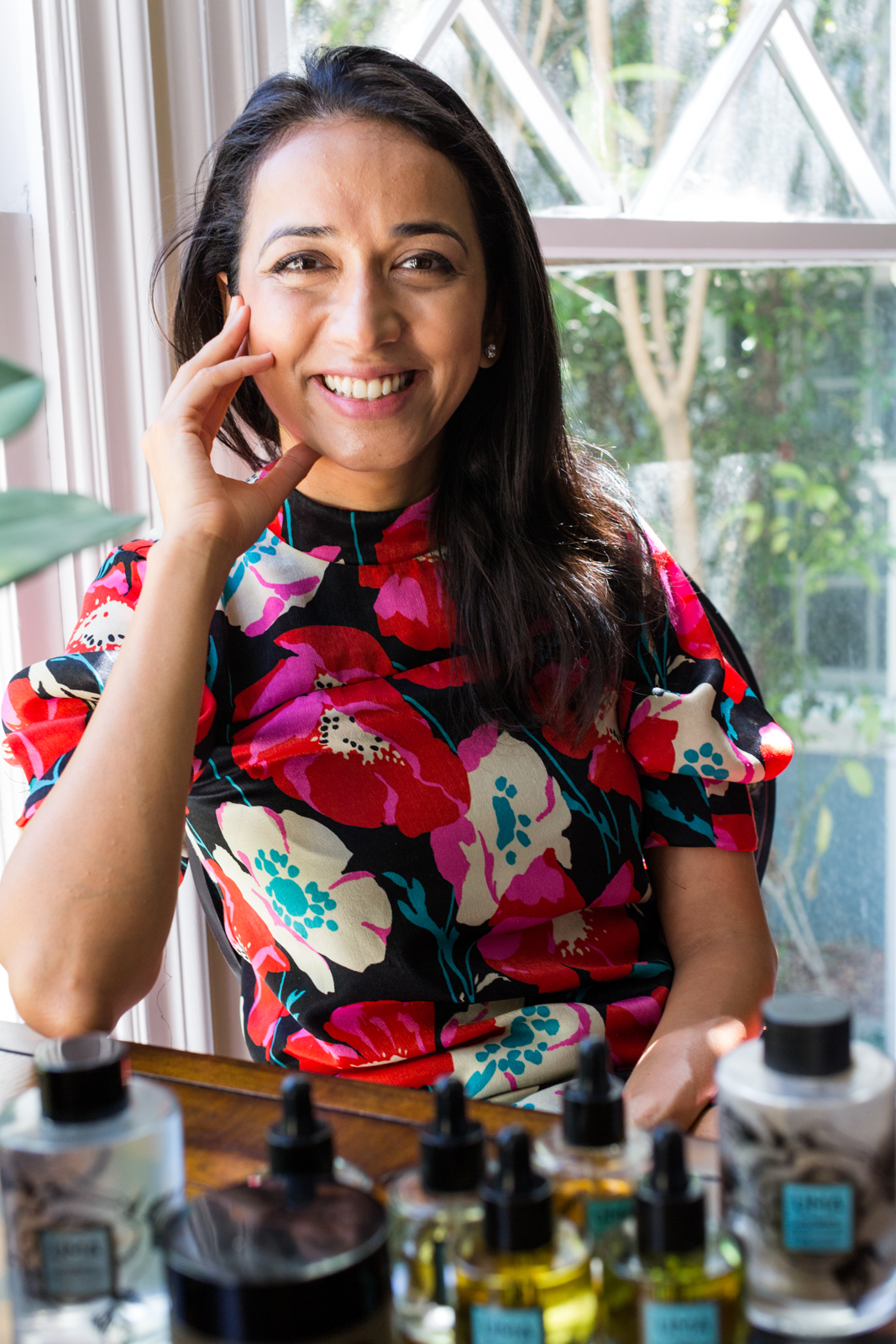Alumna-owned beauty company spreads Indian concepts of mind-body wellness

Alumna Shrankhla Holecek created Uma Oils, a beauty and wellness brand that incorporates the principles of Ayurveda. Ayurveda, a plant-based system of medicine unique to India ascribes practical lifestyle and diet guidelines to maintain optimal beauty and health, Holecek said. (Amy Dixon/Photo editor)
By Kaia Sherry
Sept. 19, 2018 4:43 a.m.
Shrankhla Holecek’s products for her brand stem from formulas that have existed for over 800 years.
Founded in 2016, Holecek said Uma Oils revitalizes skin care and wellness through the principles of Ayurveda, a system of medicine unique to India. Entirely plant-based, Ayurveda emphasizes balance with the environment, ascribing practical lifestyle and diet guidelines to maintain optimal beauty and health, said Holecek, a UCLA alumna. Each oil, a blended combination of plants chosen for their botanical properties, is a remnant of Holecek’s family history.
Ayurveda believes that beauty and wellness are intertwined. Operating off of the same idea, Uma Oils considers overall wellness, rather than focusing its efforts on the symptoms alone, said Anne Moy, director of retail.
“If blemishes are stemming from anxiety or trouble sleeping, we try to bring harmony and equilibrium to the individual so that physical manifestations of stress are resolved alongside the root of the problem,” Moy said.
Uma Oils applies such philosophical principles to skin care, specifically through the Ayurvedic lens of the three governing doshas, or bodily substances: Vata, Pitta and Kapha. Balance in the body occurs when the three doshas are balanced, and each of them are akin to personality types, Holecek said. Highlighting the importance of mind-body equilibrium, Holecek added that dosha type can be used to determine the Ayurvedic lifestyle habits needed for each individual. In regard to skin care, Uma Oils addresses skin issues specific to each dosha type.
“Just like a Myers-Briggs test, one dosha is not better or worse than the other. It’s something that’s determined at the time of your conception and shows how environmental energies manifest themselves inside you,” Holecek said. “It gives you a blueprint of how to live so that you can keep your energy most in balance.”
Holecek’s knowledge of oil formulation and Ayurvedic tradition is deeply rooted in her family history. During the 12th century, her ancestors became physicians for the royal family and still nominally hold the position today. The plant-based nature of Ayurveda led her family to acquire large parcels of land to grow medicinal ingredients like sandalwood, which were not farmed locally. The plants, grown on the brand’s farm and overseen by Holecek, are typically replanted every two years, as potency starts to dwindle within the extracted oils.
Today, many of the brand’s ingredients are still grown in central India on land dating back to the 14th century. Though the land was divided into smaller parts about 150 years ago, today the ingredients for Uma Oils are planted in the same, centuries-old region. The oils from these plants service companies like Bergdorf, Neiman, Saks, Net a Porter and Goop. Belinda Arnold, publicist for Uma Oils, said the brand oversees the entire manufacturing process from seed to bottle, never changing hands with outside entities.
“Living in Los Angeles and going to farmer’s markets, I see people starting to become more educated on wellness and what organic means,” Arnold said. “More and more, people don’t only want the organic label, but they want their (products) from a farm where they can see where their tomato is coming from.”
Though consumers are becoming more aware about where products are sourced from, Holecek said Ayurveda is still largely misrepresented in the West, touted as akin to magic by practitioners with no background in science or medicine. She said many of these practitioners extrapolate the most mystical aspects of Ayurveda to represent the entire practice, peddling crystals and colored water as miracle cures. Others equate Ayurveda to practices like homeopathy, which in actuality is a German healing modality that works on entirely different principles, Holecek said.
“A lot of people were turned off by the lack of science around Ayurveda, and thought that it was this nonscientific medicine for people on the fringes,” Holecek said. “Most importantly, many of these people weren’t educated on the holistic lifestyle principles necessary for success in mind-body balance, making it easy to spurn Ayurveda.”
Holecek, in addition to using organically sourced ingredients in her brand’s products, said she educates consumers about the scientific principles governing Ayurveda, clearing away the air of fraudulent mysticism. Holecek said she felt transparency, as well as an education-based approach, creates a way for individuals to learn Ayurveda in a personal sense, making it easier for Western audiences to adapt.
“I’ve had the same book of family formulations passed down through the generations for over 800 years,” Holecek said. “That also means our products have been recursively tested for hundreds of years, and I feel that adds a degree of credibility that is unlike any other.”


